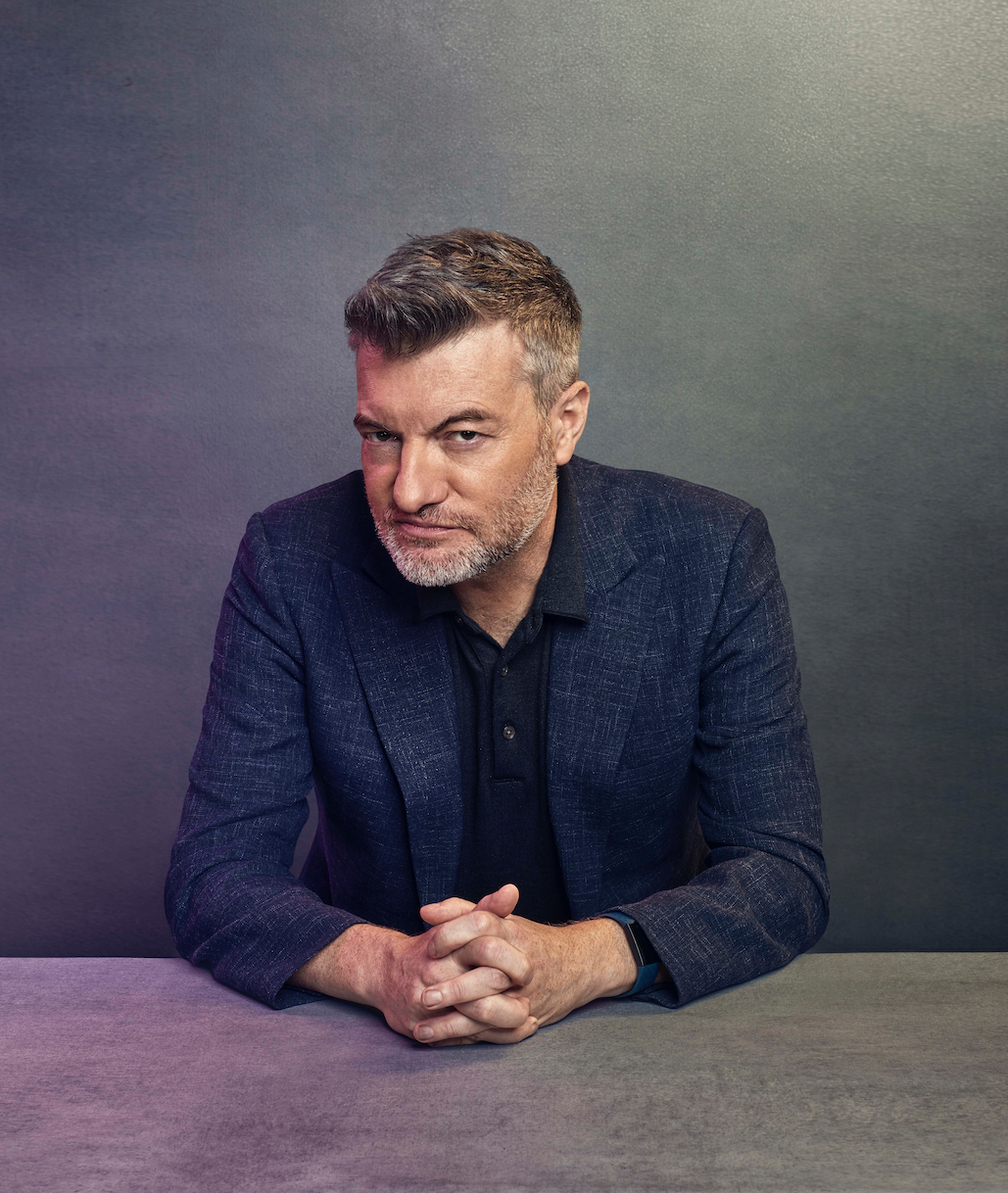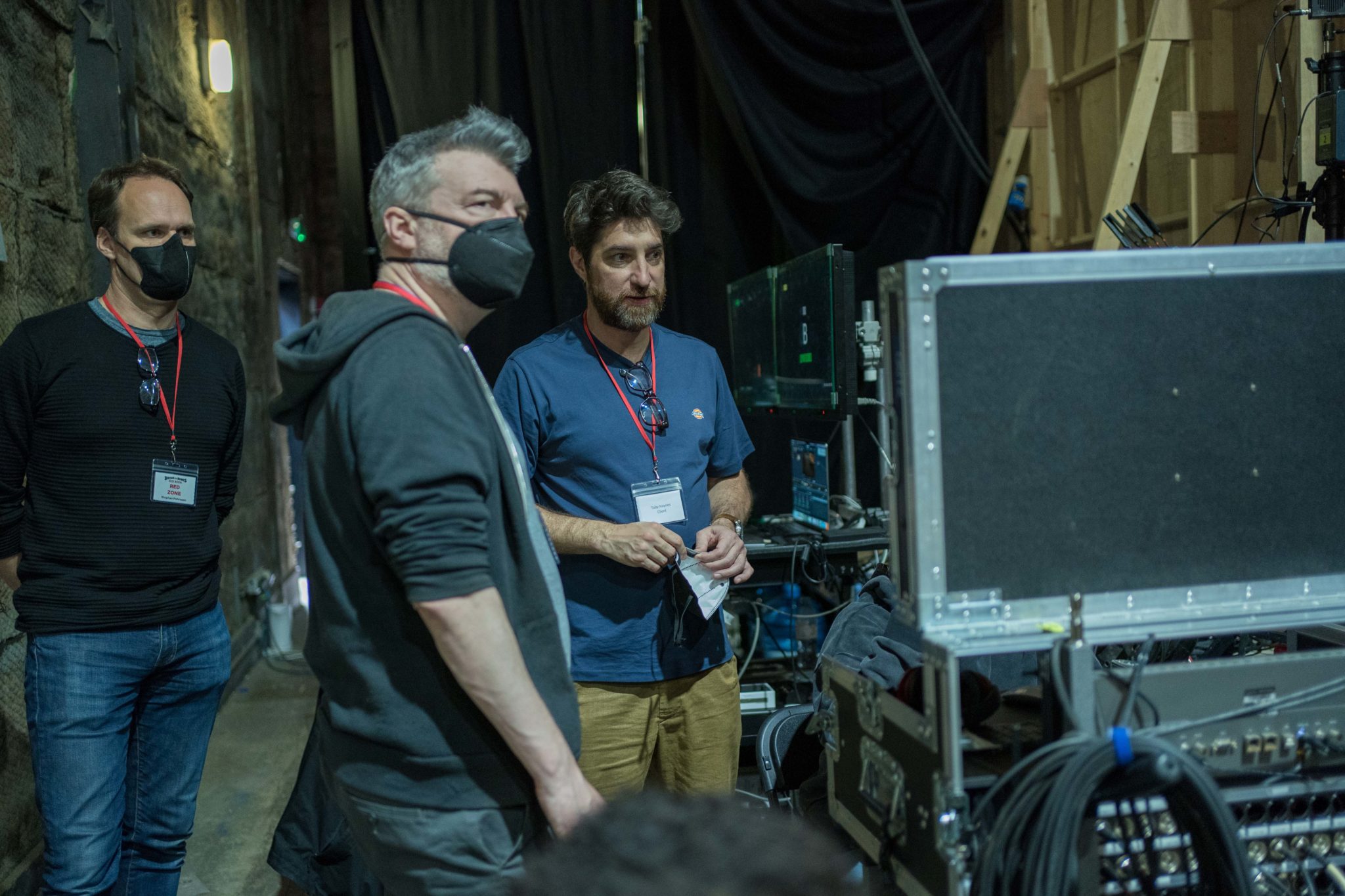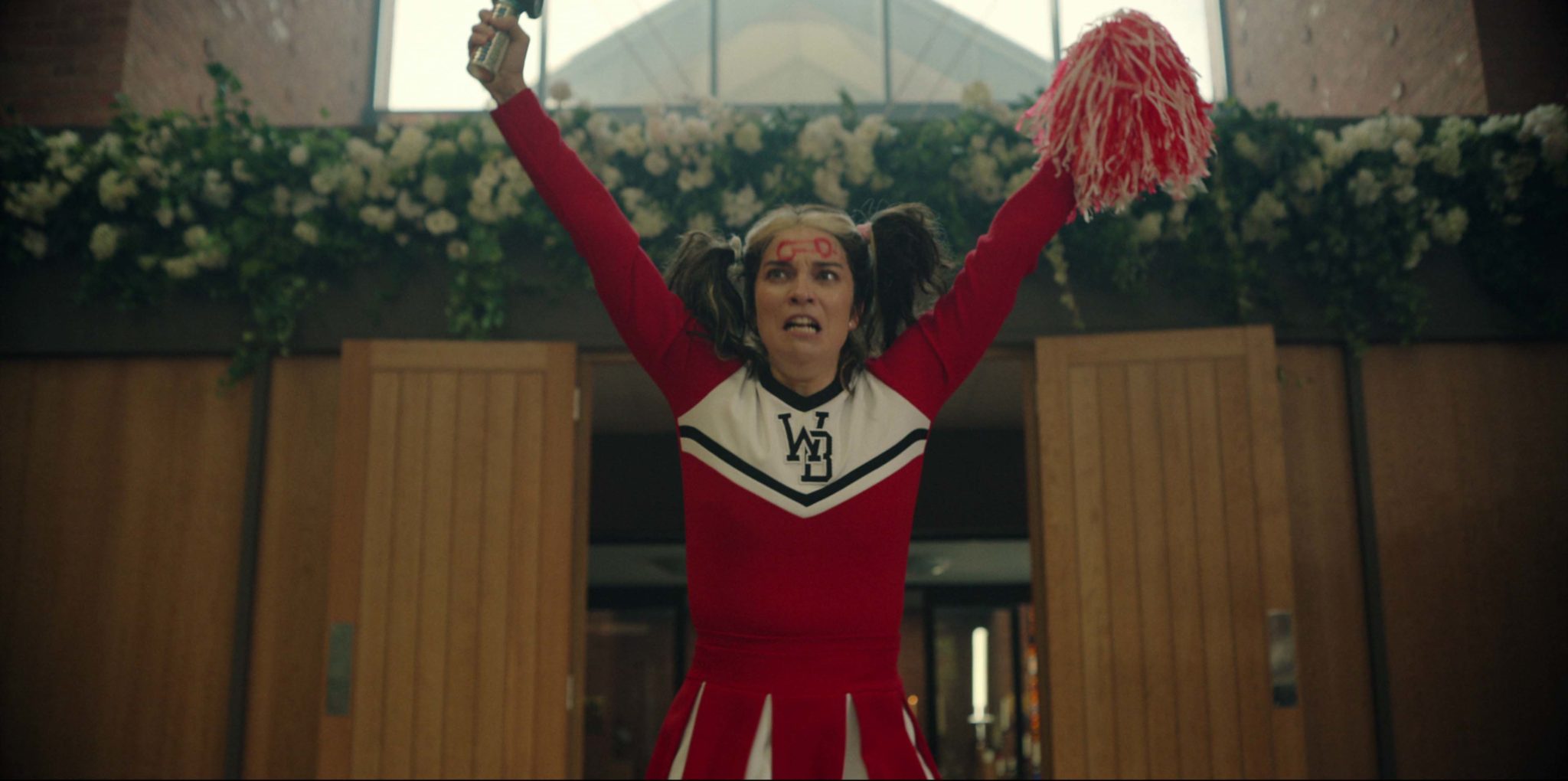- Film And TV
- 10 Jul 23

Black Mirror has returned with another batch of zeitgeist-defining dystopian tales. Paul Nolan meets creator Charlie Brooker, and stars Kate Mara and Josh Hartnett, to discuss the show’s hotly anticipated sixth series.
One of the most acclaimed and influential shows of the past decade or so, Charlie Brooker’s Black Mirror is back for a sixth season of dystopian fun and frolics. With a brilliant cast that includes Hollywood stars like Salma Hayek, Kate Mara, Zazie Beetz, Josh Harnett and more, the series once again taps into our fears around technology, whilst also dipping its toes into horror, all infused with Brooker’s trademark dark humour.
When Hot Press catches up with Brooker over Zoom, we wonder if, since the series wrapped, anything has caught his attention that might have made fertile ground for an episode?
“I was told this morning that Paul McCartney has said they’re releasing a new Beatles record, which they’ve scraped up using AI,” says the affable writer. “But in a way, we sort of did that with the Miley Cyrus episode. So no! Also, if something new has happened, it would feel a bit yesterday’s news by the time the season came out. The episodes are all different, so it takes a while to do – about 18 months.”

Charlie Brooker. Credit: Michael Wharley
Advertisement
Throughout the pandemic, tools that might have previously been considered somewhat dystopian, like Zoom itself, became a vital means of communication. Did that in any way change Brooker’s views on technology?
“I sometimes get a but frustrated when people describe the show as a warning about technology,” he muses. “I don’t think it is. We did an episode with a load of killer robot dogs – okay, that didn’t focus on the upside of technology! But generally in the stories, it’s a weak human who messes things up, rather than an inherently evil device. Imagine if we hadn’t had that stuff going into the pandemic.
“Now obviously, we all got sick of Zoom, and it could feel a bit like a prison visit, with people talking to each other mournfully through a screen. But that was way better than not being able to communicate, or only being limited to phone calls. So it is an amazing tool – it’s a love/hate, bittersweet relationship.”
There are a few standout episodes in the new season, including ‘Loch Henry’, in which a couple played by Samuel Blenkin and Myha’la Herrold get more than they bargained for, when their gentle nature documentary on the Scottish countryside evolves into an ominous true crime story. Then there’s ‘Beyond The Sea’, set in an alternate 1969, in which astronaut David (Josh Hartnett) experiences the horror of his family being butchered by a Manson Family-like cult.
Technology allows David to visit Earth using the physical form of his space-ship partner, Cliff (Breaking Bad’s Aaron Paul), thus setting in motion a truly bizarre love triangle between David, Cliff and the latter’s wife, Lana, played by House Of Cards’ Kate Mara.
It was an inspired choice to focus a story on two contrasting moments from the ’60s, the Manson murders and the Moon landing, which demonstrate the extremites of the humanity. Mara notes she was immediately enthused by the episode.
“I loved the theme of exploring people’s relationships,” she says. “Specifically for my character, it was exploring the relationship between a husband and wife. It was looking at what it means when you don’t feel connected, and when you’re yearning for that connection with your partner. My favourite things to watch, and also to play as an actor, are relationship dramas. This really fit that theme, so I was definitely onboard from the second I started reading it.”
Advertisement
“I’ve always been a fan of Charlie Brooker and Black Mirror, so I didn’t care what it was, I was gonna do it,” adds Hartnett. “When I read it, I went, ‘Oh man, that’s way darker than I expected.’ But I liked the idea of telling a story about isolation – and this is isolation on all fronts, all of the characters feel isolated. I felt like, in a weird way, my character was a sort of impetus for a love story between Cliff and Lana.
“It’s jealousy at not being seen as helpful – all of these themes were coming in, and potential reasons for the horrible things he does. I just felt real empathy for the character. I didn’t feel it was just dark for dark’s sake, I felt there was a reality to it that felt logical.”
With tension evident between Cliff and David from the very beginning, it feels like there’s a back story between the two characters, with gaps we’re supposed to fill in.
“Yeah,” nods Hartnett. “What I was hoping to display at the beginning, is that David is not just feeling isolated up in the capsule because he doesn’t get to see his family all the time. He’s feeling isolated because the only person around him physically doesn’t seem to want to have anything to do with him. Cliff has a more pessimistic view of both his own family life and life aboard the station.
“In the script, it was kind of alluded to that David was the more esoterically minded, and maybe creative person, of the two. I felt like a creative soul would need somebody to bounce off of, to have those conversations with. Of course, he’s getting some of that with his wife back home, but it’s not quite the same as in person.
“Cliff has no interest in it, so I felt that was a good jumping off point for these characters. There’s a long-standing conflict, it’s not just happening right now, but I think it’s there in the scenes.”
Notably, ‘Beyond The Sea’ is helmed by Irish director John Crowley, whose movie credits include Brooklyn and The Goldfinch. Mara feels there’s a cinematic quality to the episode.
Advertisement
“I loved the experience of this cos it did feel like we were making a mini-movie, very quickly,” she reflects. “Like the characters in the episode, it was very isolated, and all of my work was pretty much in one location, the house. It was in a condensed period of time, and it was also in the craziest heat wave in England. That put you in a very strange head-space, because it was so brutally hot.
“One of the goals as an actor is to always be a part of things that are different. You want stuff that gets you thinking outside of the box, and to work with people you really respect and love. I’ve been a fan of Black Mirror for a long time, and I really loved John Crowley. And being able to work with Aaron and Josh made it awesome all around. It was a really great experience.”
Of course, since the latest series of Black Mirror wrapped, there has been plenty of talk about AI, ChatGPT and the possible implications for the creative industries, with the subject even being part of the conversation around the current writers’ strike in the US.
Has Brooker ever considered the possibility of ChatGPT writing an instalment of the series, and would that be the ultimate episode of Black Mirror?
“It would be a shit episode!” he protests. “There was a thing I said that got slightly taken out of context, where I mentioned that I’d been toying around with ChatGPT. I’m obviously interested in tech and geeky things, so one of the first things I did when I came across ChatGPT was go, ‘Come on then, tell me a Black Mirror story idea.’ I also did this show Cunk On Earth with Diane Morgan, so I’d also tell it, ‘Describe something in the style of Philomena Cunk.’
“It would do an approximation of the idea, but really what it’s doing is hoovering up content that human writers have made, and repackaging it. It’s a very sophisticated tool, but at first glance, it looks possibly more sophisticated than it is. It’s not actually coming up with original ideas and concepts, it’s good for doing generic texts. It’s useful for doing covering letters, or you could get it emulate the style of a very neutral news report, I guess.”

Advertisement
Still, Brooker does see ChatGPT’s limitations.
“It’s not a fact checker, it can’t go out and report on things,” he emphasises. “So touch wood, it’s not going to replace human writers. I should say, it is also a really useful tool. I can see that in the hands of a human writer, it’s useful, in the same way the tools you get in Photoshop are very useful for illustrators. It’s a powerful way of doing shortcuts and filling in the blanks. I can see it’s got proper uses if human writers are operating those tools.
“I think the concern is it could be used to shortchange human writers a little, to cut them out of the process, and generate a fairly generic synopsis based on what other humans have written. And then somebody hires a writer to make sense of it, because you need a human touch. That’s the fear, which is probably a well placed concern. Either that or they’ll just rise up tomorrow afternoon and kill us all!”
In terms of inspiration for the series, meanwhile, Brooker explains that it’s an organic process.
“I don’t tend to go, ‘Well, here’s the technology pages’,” he says, “This season is a bit of a reset in many ways, partly because I was aware that the show was starting to be seen as ‘Gizmo of the week’. Somebody said to me, ‘Oh, I bet you’re going to do an episode about NFTs.’ And I thought, ‘How fucking depressing!’ So I don’t tend to sit down and stare at a technology story. The ideas tend to come up more while watching TV, or in idle conversation. Or often as a joke in the middle of another conversation.

“Like a lot of people during the pandemic, I did spend a lot of time indoors watching TV, and observing all sorts of things about it. So there are several episodes this season that are directly inspired by that. I think I’ve mentioned with ‘Joan Is Awful’, I’d watched The Dropout, which was a dramatisation of something that felt like it happened 15 minutes ago.
Advertisement
“You can see from this season I’ve watched a lot of true crime docs. I’ve watched a lot of shows set in the past as well, so everything’s grist to the mill.”
Black Mirror has had an uncanny habit of predicting future events, with perhaps the most famous example being the 2011 pilot, in which the UK PM’s unorthodox interaction with a pig was eventually echoed by a real life episode involving David Cameron. How have Brooker’s friend and family reacted to such developments?
“They regard me with suspicion, fear and mistrust,” he quips. “Again, I don’t think I’ve got any power for predicting the future, because if I did, I wouldn’t be talking to you now, I’d be down the betting shop. Like, that story about The Beatles, that’s something you could maybe see coming a while ago, if you were following the logical ramifications of this technology. But it’s an example of good technology – if there’s a new Beatles song out in the ether, that’s great. Thank god for that!”
• Black Mirror is streaming on Netflix now.










